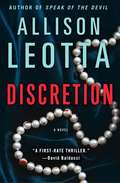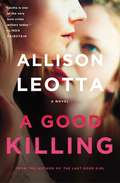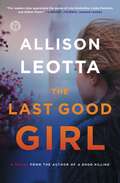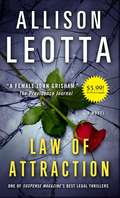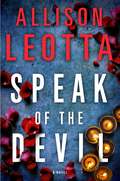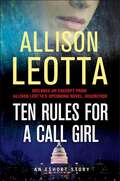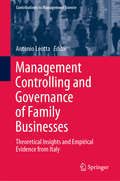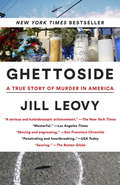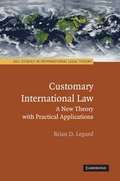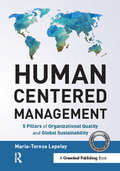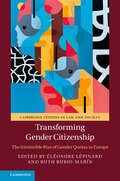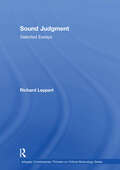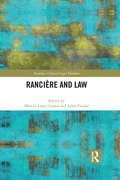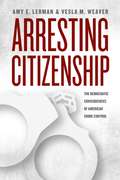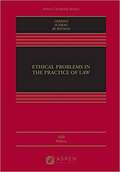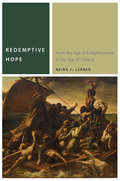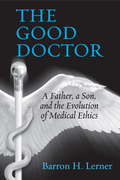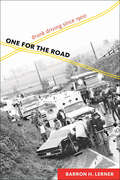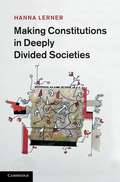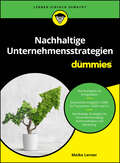- Table View
- List View
Discretion: A Novel
by Allison LeottaFor fans of Lisa Scottoline and Law and Order: SVU, former federal sex-crimes prosecutor Allison Leotta's novel explores the intersection of sex and power as Anna Curtis investigates the murder of one of DC's highest-paid escorts.When a beautiful young woman plummets to her death from the balcony of the U.S. Capitol, Assistant U.S. Attorney Anna Curtis is summoned to the scene. The evidence points to a sexual assault and murder. The victim is one of the city's highest-paid escorts. And the balcony belongs to Washington, D.C.'s sole representative to Congress, the most powerful figure in city politics. The Congressman proclaims his innocence, but he's in the middle of a tough primary fight, and the scandal could cost him the election. For Anna, the high-profile case is an opportunity. But as the political stakes rise, she realizes that a single mistake could end her career. At the same time, her budding romance with Jack Bailey, the chief homicide prosecutor, is at a crossroads. Determined to gain respect in the office, Anna wants to keep their relationship under wraps. But the mounting pressure and media attention that come with the office's most important case will inevitably expose their relationship--if it doesn't destroy it first. The investigation leads Anna to Discretion, a high-end escort service that caters to D.C.'s elite. But with each break in the case, the mystery deepens. And the further Anna ventures into D.C.'s red-light underworld, the larger the target on her own back. From the secret social clubs where Washington's most powerful men escape from public view to the asphalt "track" where the city's most vulnerable women work the streets, Discretion is a gripping exploration of sex, power, and the secrets we all keep.
A Good Killing: A Novel (Anna Curtis Series #4)
by Allison LeottaFormer federal prosecutor and critically acclaimed author Allison Leotta's spellbinding thriller follows prosecutor Anna Curtis as she heads home to Michigan to defend her sister in a case that will bring her to her knees.Newly single after calling off her wedding, sex-crimes prosecutor Anna Curtis is summoned home to Michigan when her old high school coach--a hometown hero--is killed in a fiery car crash. But Anna isn't there to prosecute a crime, she's home to support her innocent sister, Jody, who has been wrongfully accused of the coach's murder. But maybe Jody isn't so innocent after all? The police are convinced that Jody was having an affair with the married coach and killed him out of jealousy. As Anna investigates with the help of her childhood friend Cooper Bolden--an Afghan War veteran with a secret of his own--she slowly peels back the facade of her all-American hometown and discovers that no one is telling the truth about the coach, not even the people she thought she knew best. When the town rallies against them, threatening not just Jody's liberty but both sisters' lives, Anna resolves to do everything she can to save her sister and defend the only family she has left. In her best book yet, Leotta, "a highly entertaining storyteller" (George Pelecanos), explores the limits of vigilante justice, the bonds of sisterhood, and the value of the truth.
The Last Good Girl: A Novel (Anna Curtis Series #5)
by Allison LeottaFrom Allison Leotta, the "highly entertaining storyteller" (George Pelecanos) who writes "in a style that's as real as it gets" (USA TODAY), a ripped-from-the-headlines novel featuring prosecutor Anna Curtis at the center of a national story involving campus rape and the disappearance of a young woman.It was her word against his...until she disappeared. Emily Shapiro has gone missing. A freshman at a Michigan university, Emily was last seen leaving a bar near Beta Psi, a prestigious and secretive fraternity. The main suspect is Dylan Highsmith, the son of one of the most powerful politicians in the state. At first, the only clue is pieced-together surveillance footage of Emily leaving the bar that night...and Dylan running down the street after her. When prosecutor Anna Curtis discovers a video diary Emily kept during her first few months at college, it exposes the history Emily had with Dylan: she accused him of rape before disappearing. Anna is horrified to discover that Dylan's frat is known on campus as the "rape factory." The case soon gets media attention and support from Title IX activists across the country, but Anna's investigation hits a wall. Anna has to find something, anything she can use to discover Emily alive. But without a body or any physical evidence, she's under threat from people who tell her to stop before she ruins the name of an innocent young man. Inspired by real-life stories, The Last Good Girl shines a light on campus rape and the powerful emotional dynamics that affect the families of the men and women on both sides.
Law of Attraction
by Allison LeottaAs a newly minted Assistant U.S. Attorney in Washington, D.C., Anna Curtis has already developed thick skin to deal with the brutality she encounters with her daily stack of domestic violence cases. Yet when Laprea Johnson walks into Anna's life--battered by her boyfriend on the morning after Valentine's Day--there's something about this particular case that Anna can't quite shake, something that reminds the prosecutor of her own troubled past. At the trial, Laprea makes a last-minute reversal, lying on the witness stand to free her boy-friend. Shortly after he is freed, Anna is horrified to hear that Laprea's body has been found in a trash heap. Hastily assigned to prosecute the murder case alongside intimidating chief homicide prosecutor Jack Bailey, Anna's heart sinks when she learns that her own boyfriend, public defender Nick Wagner, is representing the accused. Torn between bringing the killer to justice and saving her personal life, Anna makes a series of choices that jeopardizes her career, her relationships, and her very life as she uncovers the shocking truth behind the murder. Weaving expert knowledge with deft storytelling, federal sex-crimes prosecutor and Harvard Law School graduate Allison Leotta takes readers on a thrilling ride through D.C.'s criminal justice system. From the back rooms of the U.S. Attorney's Office and the flirtations and machinations of Washington's Ivy League lawyers to the struggles of its poorest citizens on the gritty streets of Anacostia, Law of Attraction is a gripping debut from an exciting new talent.
Speak of the Devil
by Allison LeottaFor readers of Kathy Reichs, Lisa Scottoline, Patricia Cornwell, and Lisa Gardner, a new thriller by former federal sex-crimes prosecutor Allison Leotta.SPEAK OF THE DEVIL--AND HE WILL APPEAR On the very night she gets engaged to the man she loves, sex-crimes prosecutor Anna Curtis's professional life takes a shocking turn that threatens everything she holds dear. While Anna is enjoying a romantic dinner capped off by a marriage proposal, a few miles away two separate groups are gearing up to raid a brothel. A vicious killer known as Diablo--the Devil--leads one group. A few minutes later, Anna's own investigative team heads in to search the brothel, as part of the fight against human trafficking in D.C. Both groups are caught off guard, with deadly results. As Anna investigates the bloody face-off, the boundaries between her work and home life begin to blur. Though eager to focus on her new fiancé, the chief homicide prosecutor Jack Bailey, and her soon-to-be stepdaughter, Olivia, this case and the search for Diablo are never far from her mind. When Anna discovers a web of long-buried secrets and official lies leading straight to her doorstep, the truth about this case threatens to rob her of the happiness she seemed so close to securing. And everything Anna counted on becomes a question mark as Diablo moves in for yet another kill. Allison Leotta draws on her experience as a D.C. sex-crimes prosecutor to take readers into the back rooms of the U.S. Attorney's Office, the hidden world of the Witness Protection Program, and the secret rituals of one of America's most dangerous gangs. Universally praised by bestselling authors from Catherine Coulter and George Pelecanos to Lisa Scottoline and David Baldacci, Leotta weaves fact and fiction to create her best novel yet.
Ten Rules for a Call Girl: An eShort Story
by Allison LeottaFrom former federal sex-crimes prosecutor Allison Leotta, an eShort story about the secret life of Washington, D.C.'s highest-paid escorts.Beautiful Georgetown undergrad Caroline McBride almost has it all--a loving fiancée, a promising academic career, and a college life of fabulous parties--but she can't afford it. When her father becomes ill, plunging her family into debt, she reluctantly agrees to meet Madeleine, the madam of a high-end escort service. Catering to the most powerful men in D.C., Caroline can make more money in one night than in a month at her part-time college job. And no one has to know. All she has to do is follow the madam's ten simple rules. A riveting story of D.C.'s red-light underworld and the life of a modern courtesan, Ten Rules for a Call Girl is fascinating and addictive. Includes an excerpt from Allison Leotta's new novel, Discretion!
Management Controlling and Governance of Family Businesses: Theoretical Insights and Empirical Evidence from Italy (Contributions to Management Science)
by Antonio LeottaThis book addresses a selection of major topics in family businesses, namely ‘managerialization’ and ‘professionalization’, succession, internationalization, access to financial markets, and how governance and control systems can help family firms respond to common problems inherent in the business. Written by prominent experts, the respective chapters highlight the interactions between these topics in order to develop a systems view of the distinctive challenges, and of the potential roles that governance and control systems can play in these contexts. The book is divided into two main parts, the first of which reviews the current literature and develops a comprehensive theoretical framework. Based on these theoretical insights, the second part then interprets and discusses the empirical evidence, including case studies on family-run firms in Italy.
Ghettoside: A True Story of Murder in America
by Jill LeovyA masterly work of literary journalism about a senseless murder, a relentless detective, and the great plague of homicide in America. On a warm spring evening in South Los Angeles, a young man is shot and killed on a sidewalk minutes away from his home, one of the thousands of black Americans murdered that year. His assailant runs down the street, jumps into an SUV, and vanishes, hoping to join the scores of killers in American cities who are never arrested for their crimes. But as soon as the case is assigned to Detective John Skaggs, the odds shift. Here is the kaleidoscopic story of the quintessential, but mostly ignored, American murder—a “ghettoside” killing, one young black man slaying another—and a brilliant and driven cadre of detectives whose creed is to pursue justice for forgotten victims at all costs. Ghettoside is a fast-paced narrative of a devastating crime, an intimate portrait of detectives and a community bonded in tragedy, and a surprising new lens into the great subject of why murder happens in our cities—and how the epidemic of killings might yet be stopped.
Customary International Law
by Brian D. LepardCustomary international law, although long recognized as a primary source of international law, remains replete with enigmas, both conceptual and practical. These include how to determine the existence of opinio juris, the function of the state practice requirement, the definition of jus cogens customary norms, and the relationship between customary international law and ethics. In part because of these enigmas, the subject has generated a wide-ranging literature. However, no recent book-length work has attempted to articulate a comprehensive theory of customary international law that can effectively resolve these questions. This book sets out to accomplish this goal. Its approach is unique in a number of ways. For example, it is multidisciplinary and draws insights from fields such as legal theory, philosophy, political science, and game theory. In addition, it is anchored in a sophisticated ethical framework and explores at length the interconnections between customary international law and ethics.
ASIL Studies in International Legal Theory: Reexamining Customary International Law
by Lepard Brian D.Reexamining Customary International Law takes on the complex issues and controversies surrounding the history, theory, and practice of customary international law as it reexamines customary law's increasingly important role in world affairs. It incorporates the expertise of distinguished authors to probe many difficult issues that remain unresolved concerning the doctrine of customary law. At the same time, this book engages in a profound exploration of the practical role of customary international law in a variety of important fields, including humanitarian law, human rights law, and air and space law.
Human Centered Management: 5 Pillars of Organizational Quality and Global Sustainability (Human Centered Management)
by Maria-Teresa LepeleyWe have never had more freedom to acquire information to make decisions, and organizations have never been so pressed to demonstrate accountability as they communicate with better informed customers and users. People who work IN an organization must also work FOR the organization to accomplish its mission. In this environment, humans are no longer just a resource; they are the reason an organization exists. New constructs are needed to ensure this human-centered paradigm shift.This book sets out the rationale for this shift and stimulates the discussion and the discovery of effective approaches and solutions to innovate for social and environmental good. Written by an expert in quality standards, the book offers a coherent model which synchronizes the organizational structure with the talent required to develop resilient and agile work environments. New strategies to develop talent will be critical, and multidisciplinary approaches from scholars and practitioners from around the world will be required to effectively collaborate and articulate the solutions. The proposition in the book focuses on continuous improvement and interdisciplinary collaboration between scholars and practitioners across different industries, sectors, and national borders in order to address the unavoidable disruptions in the global VUCA environment.
Transforming Gender Citizenship: The Irresistible Rise of Gender Quotas in Europe (Cambridge Studies in Law and Society)
by Éléonore Lépinard Ruth Rubio-MarínGender quotas are a controversial policy measure. However, over the past twenty years they have been widely adopted around the world and especially in Europe. They are now used in politics, corporate boards, state and local public administration and even in civil society organizations. This book explores this unprecedented phenomenon, providing a unique comparative perspective on gender quotas' adoption across thirteen European countries. It also studies resistance to gender quotas by political parties and supreme courts. Providing up-to-date comprehensive data on gender quotas regulations, Transforming Gender Citizenship proposes a typology of countries, from those which have embraced gender quotas as a new way to promote gender equality in all spheres of social life, to those who have consistently refused gender quotas as a tool for gender equality. Reflecting on divergences and commonalities across Europe, the authors analyze how gender quotas may transform dominant conception of citizenship and gender equality.
Sound Judgment: Selected Essays (Ashgate Contemporary Thinkers On Critical Musicology Ser.)
by Richard LeppertThe essays in Sound Judgment span the full career of Richard Leppert, from his earliest to work that appears here for the first time, on subjects drawn from early modernity to the present concerning music both popular and classical, European and North American. Noted for his path-breaking interdisciplinary scholarship on music and visual culture, the collection includes key essays on music's visualization in art practices in virtually all visual media, including film. The fourteen essays comprising this volume demonstrate Leppert's many contributions to critical musicology, particularly in the areas of aesthetics as well as social and intellectual history, all of it grounded in a heterodox body of critical and cultural theory, with the work of Theodor W. Adorno particularly noteworthy. The collection is preceded by an introduction in which Leppert traces his intellectual development, defined in large part by the social, cultural, and political upheavals of the 1960s and their aftermath both in the academy and in society at large.
Ranciere and Law (Nomikoi: Critical Legal Thinkers)
by Monica Lopez Lerma Julen EtxabeThis book is the first to approach Jacques Rancière’s work from a legal perspective. A former student of Louis Althusser, Rancière is one of the most important contemporary French philosophers of recent decades: offering an original and path-breaking way to think politics, democracy and aesthetics. Rancière’s work has received wide and increasing critical attention, but no study exists so far that reflects on the wider implications of Rancière for law and for socio-legal studies. Although Rancière does not pay much specific attention to law—and there is a strong temptation to identify law with what he terms the "police order"—much of Rancière’s historical work highlights the creative potential of law and legal language, with important legal implications and ramifications. So, rather than excavate the Rancièrean corpus for isolated statements about the law, this volume reverses such a method and asks: what would a Rancière-inspired legal theory look like? Bringing together specialists and scholars in different areas of law, critical theory and philosophy, this rethinking of law and socio-legal studies through Rancière provides an original and important engagement with a range of contemporary legal topics, including constituent power and democracy, legal subjectivity, human rights, practices of adjudication, refugees, the nomos of modernity, and the sensory configurations of law. It will, then, be of considerable interest to those working in these areas.
The Modern Prison Paradox
by Amy E. LermanIn The Modern Prison Paradox, Amy E. Lerman examines the shift from rehabilitation to punitivism that has taken place in the politics and practice of American corrections. She argues that this punitive turn has had profoundly negative consequences for both crime control and American community life. Professor Lerman's research shows that spending time in America's increasingly violent and castigatory prisons strengthens inmates' criminal networks and fosters attitudes that increase the likelihood of criminal activity following parole. Additionally, Professor Lerman assesses whether America's more punitive prisons similarly shape the social attitudes and behaviors of correctional staff. Her analysis reveals that working in more punitive prisons causes correctional officers to develop an "us against them" mentality while on the job, and that the stress and wariness officers acquire at work carries over into their personal lives, straining relationships with partners, children, and friends.
Arresting Citizenship: The Democratic Consequences of American Crime Control
by Amy E. Lerman Vesla M. WeaverThe numbers are staggering: One-third of America’s adult population has passed through the criminal justice system and now has a criminal record. Many more were never convicted, but are nonetheless subject to surveillance by the state. Never before has the American government maintained so vast a network of institutions dedicated solely to the control and confinement of its citizens. A provocative assessment of the contemporary carceral state for American democracy, Arresting Citizenship argues that the broad reach of the criminal justice system has fundamentally recast the relation between citizen and state, resulting in a sizable--and growing--group of second-class citizens. From police stops to court cases and incarceration, at each stage of the criminal justice system individuals belonging to this disempowered group come to experience a state-within-a-state that reflects few of the country’s core democratic values. Through scores of interviews, along with analyses of survey data, Amy E. Lerman and Vesla M. Weaver show how this contact with police, courts, and prisons decreases faith in the capacity of American political institutions to respond to citizens’ concerns and diminishes the sense of full and equal citizenship--even for those who have not been found guilty of any crime. The effects of this increasingly frequent contact with the criminal justice system are wide-ranging--and pernicious--and Lerman and Weaver go on to offer concrete proposals for reforms to reincorporate this large group of citizens as active participants in American civic and political life.
Ethical Problems in the Practice of Law
by Lisa G. Lerman Philip G. SchragThis book is an introduction to the law that governs lawyers. It includes two chapters on some important aspects of the legal profession.
Ethical Problems In The Practice Of Law (Aspen Casebook Series)
by Lisa G. Lerman Philip G. Schrag Robert RubinsonThis problem-based book reflects the authors' broad range of teaching, clinical, and policy-making experience. Ethical Problems in the Practice of Law's carefully crafted ethical problems challenge students to engage in a deep analysis and participate in lively class discussion. New to the Fifth Edition: Comprehensive updates to reflect the many new developments in this fast-moving field. The authors carefully revised the entire text, adding six new problems and countless new case examples to illustrate the operation of "lawyer law." Expanded coverage of ethics issues for arbitrators and mediators. Expanded coverage of the ethical challenges and pitfalls faced by lawyers in light of advancing technology. Deeper discussion of issues of diversity and discrimination in the legal profession. Updated and enhanced materials on innovations and transformations in the legal profession and the regulation of lawyers in the United States and abroad, including innovation in financing law practice and litigation, and offshoring legal work. Additional material on continuing efforts to address the unmet need for legal services, including licensing of nonlawyers to provide limited legal services. Professors and students will benefit from: Real-world problems, most based on actual cases, in which students are asked to step into the shoes of practicing lawyers to confront difficult ethical dilemmas that often arise in the early years of law practice. Problem-based approach, often based on real-life cases, offers students a practical way to test their understanding Problem method engages students and generates class discussion, because most problems present head-scratching dilemmas that students must puzzle through together Graphics (cartoons, tables, photos) throughout, which make the presentation lively and engaging Clear expositions of the law allow professors to devote the majority of class time to interactive discussion of the problems Transformation of a course from an often-boring upper-class requirement to a learning environment that is educationally rich, engaging and fun Shocking examples of recent lawyer misconduct maintain student interest A readable and enjoyable law school textbook
Redemptive Hope: From the Age of Enlightenment to the Age of Obama
by Akiba J. LernerThis is a book about the need for redemptive narratives to ward off despair and the dangers these same narratives create by raising expectations that are seldom fulfilled. The quasi-messianic expectations produced by the election of President Barack Obama in 2008, and their diminution, were stark reminders of an ongoing struggle between ideals and political realities. Redemptive Hope begins by tracing the tension between theistic thinkers, for whom hope is transcendental, and intellectuals, who have striven to link hopes for redemption to our intersubjective interactions with other human beings. Lerner argues that a vibrant democracy must draw on the best of both religious thought and secular liberal political philosophy. By bringing Richard Rorty’s pragmatism into conversation with early-twentieth-century Jewish thinkers, including Martin Buber and Ernst Bloch, Lerner begins the work of building bridges, while insisting on holding crucial differences in dialectical tension. Only such a dialogue, he argues, can prepare the foundations for modes of redemptive thought fit for the twenty-first century.
The Good Doctor
by Barron H. LernerThe story of two doctors, a father and son, who practiced in very different times and the evolution of the ethics that profoundly influence health care As a practicing physician and longtime member of his hospital's ethics committee, Dr. Barron Lerner thought he had heard it all. But in the mid-1990s, his father, an infectious diseases physician, told him a stunning story: he had physically placed his body over an end-stage patient who had stopped breathing, preventing his colleagues from performing cardiopulmonary resuscitation, even though CPR was the ethically and legally accepted thing to do. Over the next few years, the senior Dr. Lerner tried to speed the deaths of his seriously ill mother and mother-in-law to spare them further suffering. These stories angered and alarmed the younger Dr. Lerner--an internist, historian of medicine, and bioethicist--who had rejected physician-based paternalism in favor of informed consent and patient autonomy. The Good Doctor is a fascinating and moving account of how Dr. Lerner came to terms with two very different images of his father: a revered clinician, teacher, and researcher who always put his patients first, but also a physician willing to "play God," opposing the very revolution in patients' rights that his son was studying and teaching to his own medical students. But the elder Dr. Lerner's journals, which he had kept for decades, showed the son how the father's outdated paternalism had grown out of a fierce devotion to patient-centered medicine, which was rapidly disappearing. And they raised questions: Are paternalistic doctors just relics, or should their expertise be used to overrule patients and families that make ill-advised choices? Does the growing use of personalized medicine--in which specific interventions may be best for specific patients--change the calculus between autonomy and paternalism? And how can we best use technologies that were invented to save lives but now too often prolong death? In an era of high-technology medicine, spiraling costs, and health-care reform, these questions could not be more relevant. As his father slowly died of Parkinson's disease, Barron Lerner faced these questions both personally and professionally. He found himself being pulled into his dad's medical care, even though he had criticized his father for making medical decisions for his relatives. Did playing God--at least in some situations--actually make sense? Did doctors sometimes "know best"? A timely and compelling story of one family's engagement with medicine over the last half century, The Good Doctor is an important book for those who treat illness--and those who struggle to overcome it.From the Hardcover edition.
One for the Road: Drunk Driving since 1900
by Barron H. LernerDon’t drink and drive. It's a deceptively simple rule, but one that is all too often ignored. And while efforts to eliminate drunk driving have been around as long as automobiles, every movement to keep drunks from driving has hit some alarming bumps in the road. Barron H. Lerner narrates the two strong—and vocal—sides to this debate in the United States: those who argue vehemently against drunk driving, and those who believe the problem is exaggerated and overregulated. A public health professor and historian of medicine, Lerner asks why these opposing views exist, examining drunk driving in the context of American beliefs about alcoholism, driving, individualism, and civil liberties. Angry and bereaved activist leaders and advocacy groups like Mothers Against Drunk Driving campaign passionately for education and legislation, but even as people continue to be killed, many Americans remain unwilling to take stronger steps to address the problem. Lerner attributes this attitude to Americans’ love of drinking and love of driving, an inadequate public transportation system, the strength of the alcohol lobby, and the enduring backlash against Prohibition. The stories of people killed and maimed by drunk drivers are heartrending, and the country’s routine rejection of reasonable strategies for ending drunk driving is frustratingly inexplicable. This book is a fascinating study of the culture of drunk driving, grassroots and professional efforts to stop it, and a public that has consistently challenged and tested the limits of individual freedom. Why, despite decades and decades of warnings, do people still choose to drive while intoxicated? One for the Road provides crucial historical lessons for understanding the old epidemic of drunk driving and the new epidemic of distracted driving.
Making Constitutions in Deeply Divided Societies
by Hanna LernerHow can societies still grappling over the common values and shared vision of their state draft a democratic constitution? This is the central puzzle of Making Constitutions in Deeply Divided Societies. While most theories discuss constitution-making in the context of a moment of revolutionary change, Hanna Lerner argues that an incrementalist approach to constitution-making can enable societies riven by deep internal disagreements to either enact a written constitution or function with an unwritten one. She illustrates the process of constitution-writing in three deeply divided societies - Israel, India and Ireland - and explores the various incrementalist strategies deployed by their drafters. These include the avoidance of clear decisions, the use of ambivalent legal language and the inclusion of contrasting provisions in the constitution. Such techniques allow the deferral of controversial choices regarding the foundational aspects of the polity to future political institutions, thus enabling the constitution to reflect a divided identity.
International Differences in Entrepreneurship
by Josh Lerner Antoinette SchoarOften considered one of the major forces behind economic growth and development, the entrepreneurial firm can accelerate the speed of innovation and dissemination of new technologies, thus increasing a country's competitive edge in the global market. As a result, cultivating a strong culture of entrepreneurial thinking has become a primary goal throughout the world. Surprisingly, there has been little systematic research or comparative analysis to show how the growth of entrepreneurship differs among countries in various stages of development. International Differences in Entrepreneurship fills this void by explaining how a country's institutional differences, cultural considerations, and personal characteristics can affect the role that entrepreneurs play in its economy. Developing an understanding of the origins of entrepreneurs as well as the choices they make and the complexity of their activities across countries and industries are of central importance to this volume. In addition, contributors consider how environmental factors of individual economies, such as market regulation, government subsidies for banks, and support for entrepreneurial culture affect the industry and the impact that entrepreneurs have on growth in developing nations.
The Mind and Faith of Justice Holmes: His Speeches, Essays, Letters, and Judicial Opinions
by Max LernerA reprint of the Little, Brown edition of 1943. Acidic paper. Annotation copyright Book News, Inc. Portland, Or.
Nachhaltige Unternehmensstrategien für Dummies (Für Dummies)
by Meike LernerMit der richtigen Nachhaltigkeitsstrategie auf Erfolgskurs Es gibt viele Gründe für Unternehmen, Nachhaltigkeit strategisch zu implementieren. Nicht nur Kunden, Mitarbeiter und Partner legen zunehmend Wert auf nachhaltiges Wirtschaften. Auch viele gesetzliche Vorgaben verlangen von Unternehmen ein nachhaltiges Handeln ? etwa die EU-Taxonomie-Verordnung, das Lieferkettensorgfaltsgesetz oder die Corporate Sustainability Reporting Directive. Und schlie?lich blicken auch Geldgeber im Rahmen ihrer Risikoanalyse sehr genau auf die Nachhaltigkeitsbemühungen von Unternehmen. Wie Ihr Unternehmen Schritt für Schritt auf allen Ebenen nachhaltiger wird und Sie die gesetzlichen Anforderungen einhalten, erfahren Sie in diesem Buch. Sie erfahren Wie Sie die Sustainable Development Goals strategisch setzen Wie Sie eine gesetzeskonforme Nachhaltigkeitsberichterstattung installieren Wie Sie ein nachhaltiges Beschaffungswesen etablieren Wie Sie ein Green Office einrichten
